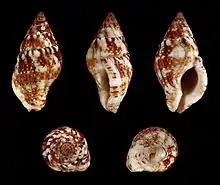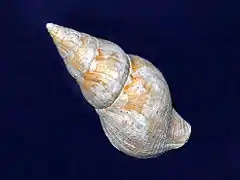Euthria cornea
Euthria cornea, common name : the spindle euthria, is a species of sea snail, a marine gastropod mollusk in the family Buccinidae, the true whelks.[1]
| Euthria cornea | |
|---|---|
 | |
| Scientific classification | |
| Kingdom: | |
| Phylum: | |
| Class: | |
| (unranked): | |
| Superfamily: | |
| Family: | |
| Subfamily: | Buccininae |
| Genus: | |
| Species: | E. cornea |
| Binomial name | |
| Euthria cornea (Linnaeus, 1758) | |
| Synonyms[1][2] | |
| |
Fossil reports
The fossil record of this species dates back to the Miocene (age range: from 11.608 to 7.246 million years ago). These fossils have been found in Italy.[3]

Description
The shell size of Euthria cornea varies between 20mm and 80 mm.[2] This mollusk has a robust fusiform shell, with a sharp apex. The opening is oval, wide, with slight striae. The horny operculum is oval. The coloration of the shell is quite variable, with irregular dark spots on a brownish-gray background. The mollusk is orange. This predatory species mainly feeds on small bivalves, opening slightly the valves with the strong foot and sucking the tissues.[4]
Distribution and habitat
This species occurs in the Atlantic Ocean offPortugal and Morocco and in the Mediterranean Sea.[2] It can be found at depths of 5 to 30 m, mainly on rocky substrates.[4]
References
- Euthria cornea (Linnaeus, 1758). Retrieved through: World Register of Marine Species on 30 October 2010.
- Gastropods.com = Euthria cornea; accessed :
- Fossilworks
- Paleofox
- Lamarck J.B. (1816). Liste des objets représentés dans les planches de cette livraison. In: Tableau encyclopédique et méthodique des trois règnes de la Nature. Mollusques et Polypes divers. Agasse, Paris. 16 pp.
- Gofas, S.; Le Renard, J.; Bouchet, P. (2001). Mollusca, in: Costello, M.J. et al. (Ed.) (2001). European register of marine species: a check-list of the marine species in Europe and a bibliography of guides to their identification. Collection Patrimoines Naturels, 50: pp. 180–213
- Brunetti M.M. & Della Bella G. (2016). Revisioni di alcuni generi della famiglia Buccinidae Rafinesque, 1815 nel Plio-Pleistocene del Bacino Mediterraneo, con descrizione di tre nuove specie. Bollettino Malacologico. 52: 3-37
External links
- Xenophora
- Photos of Euthria cornea on Sealife Collection
- Linnaeus, C. (1758). Systema Naturae per regna tria naturae, secundum classes, ordines, genera, species, cum characteribus, differentiis, synonymis, locis. Editio decima, reformata [10th revised edition, vol. 1: 824 pp. Laurentius Salvius: Holmiae.]
- Risso, A. (1826-1827). Histoire naturelle des principales productions de l'Europe Méridionale et particulièrement de celles des environs de Nice et des Alpes Maritimes. Paris, Levrault:. . 3(XVI): 1-480, 14 pls
- Locard A. (1886). Prodrome de malacologie française. Catalogue général des mollusques vivants de France. Mollusque marins. Lyon, H. Georg & Paris, Baillière : pp. X + 778
- Monterosato T. A. (di) (1884). Nomenclatura generica e specifica di alcune conchiglie mediterranee. Palermo, Virzi, 152 pp
| Wikimedia Commons has media related to Euthria cornea. |